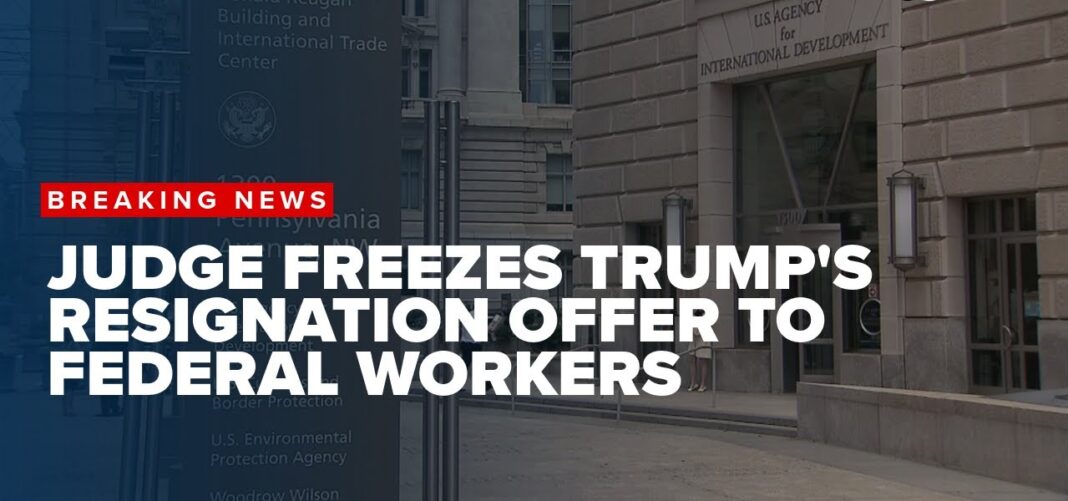The Trump administration’s aggressive effort to shrink the federal government has sparked intense debate, with a midnight deadline for federal employees to accept voluntary buyouts now temporarily on hold due to legal challenges. At the heart of this effort is Elon Musk, whose push for massive job cuts across multiple agencies has alarmed employees, unions, and political leaders. This article analyzes the latest developments, the political and economic impact, and what the future holds for federal employment and governance.
The Federal Buyout Program and Judicial Intervention
The federal buyout program, spearheaded by the Trump administration, was designed to reduce the size of the government workforce by offering employees a severance package if they agreed to leave their jobs voluntarily. Under this plan, employees who accepted the buyout would receive compensation through September, but those who refused faced potential layoffs.
However, a federal judge in Massachusetts has placed the initiative on hold, delaying its implementation until oral arguments are heard on Monday. The ruling comes as multiple federal unions argue that the plan lacks transparency and could force employees into untenable positions without job security guarantees.
- Federal workers across agencies, including the CIA, FBI, and Treasury, were impacted by the buyout offer.
- Unions raised concerns about potential unfair dismissals and lack of employment guarantees.
- A Massachusetts judge temporarily halted the buyout program pending further review.
- The White House has not yet responded to the ruling.
The Role of Elon Musk: Job Cuts and Agency Overhauls
Elon Musk, a prominent business mogul and tech innovator, has been at the center of the government’s workforce restructuring. Musk’s “Doge” team, reportedly working closely with the administration, has been reviewing job eliminations across various agencies, including:
- The Treasury Department
- The U.S. Agency for International Development (USAID)
- The CIA and the Environmental Protection Agency (EPA)
Musk’s influence in the process has drawn backlash from Democratic leaders, who claim his access to federal data and decision-making processes raises ethical and legal concerns.
The Shutdown of Environmental Justice Programs
Another major development is the Trump administration’s decision to eliminate the Environmental Protection Agency’s (EPA) Office of Environmental Justice and External Civil Rights. This office was responsible for ensuring that disadvantaged communities receive support to combat pollution and climate change-related challenges.
While the administration claims this move is part of its broader effort to dismantle DEI (Diversity, Equity, and Inclusion) programs, employees within the EPA argue that environmental justice is not solely a DEI issue but a crucial public health initiative.
- The closure of the EPA’s Environmental Justice Office leaves communities vulnerable to environmental hazards.
- Employees within the agency are in limbo, awaiting further decisions on potential layoffs.
- The administration views these initiatives as unnecessary government overreach, while opponents argue they are essential for equitable environmental policies.
Political and Legal Pushback
Democratic lawmakers, led by Congresswoman Melanie Stansbury, have been vocal in opposing the administration’s sweeping federal employment cuts. Recently, over two dozen members of Congress attempted to gain access to the Treasury Department to investigate Musk’s alleged access to government payment systems and personnel data.
Despite the Democrats’ protest efforts, their power to block these actions is limited due to Republican control of Congress and the White House. However, the judicial system remains an avenue for resistance, with multiple lawsuits challenging Musk’s involvement and the legality of the workforce reductions.
Legal Challenges:
- A federal court has ruled that Musk’s job elimination plan may violate labor laws.
- State attorneys general have sued to halt layoffs and ensure employee protections.
- Democratic lawmakers have sought subpoenas for Musk but have been blocked by Republican majorities.
The Future of Federal Employment and Governance
The current situation raises critical questions about the future of government employment, policy priorities, and labor rights. If the administration succeeds in cutting thousands of jobs, it could have long-term economic and political consequences.
Possible Scenarios:
- Massive Job Cuts Move Forward – If courts do not intervene, thousands of federal employees could face forced layoffs, fundamentally reshaping government operations.
- Judicial Protection Delays Cuts – Legal battles could stall workforce reductions, preserving jobs but increasing tensions between lawmakers and the administration.
- Public and Political Backlash Leads to Reversals – If public outrage grows, the administration may scale back or reconsider some of its policies to avoid political damage ahead of the next election cycle.
Implications for the Economy:
- If job cuts proceed, consumer spending could decline, particularly in regions reliant on federal employment.
- Government agencies could struggle with understaffing, leading to inefficiencies in services such as national security, environmental protection, and economic oversight.
- Increased reliance on the private sector may shift responsibilities from the public workforce to corporations, potentially altering governance structures.
What can be possible consequences?
The Trump administration’s efforts to reduce the federal workforce have sparked significant legal, political, and ethical debates. With Musk’s involvement adding another layer of controversy, it remains unclear how the situation will unfold.
Key Takeaways:
- A federal judge has placed a temporary hold on Trump’s federal employee buyout program.
- Elon Musk’s role in government layoffs is raising concerns over corporate influence in federal operations.
- The closure of the EPA’s Environmental Justice Office has drawn criticism from environmental and civil rights advocates.
- Legal battles and congressional pushbacks may determine the final outcome of the administration’s restructuring plans.
Future Considerations:
- For Employees: Federal workers should stay informed about legal rulings and union protections.
- For Lawmakers: Continued legislative oversight and legal challenges will be crucial in shaping federal employment policies.
- For Businesses and Citizens: The restructuring of government agencies could impact business operations and public services, making it essential for stakeholders to monitor policy changes.
Disclaimer
This article is based on a program discussion and reflects an analysis of the topics presented. It does not constitute financial, legal, or political advice. Readers should conduct their own research and consult professionals before forming conclusions about the Trump administration’s policies and their implications.
Dr. Noah Alvarado is a global economist specializing in international trade policies and macroeconomic analysis. His research has been published in prominent journals.




